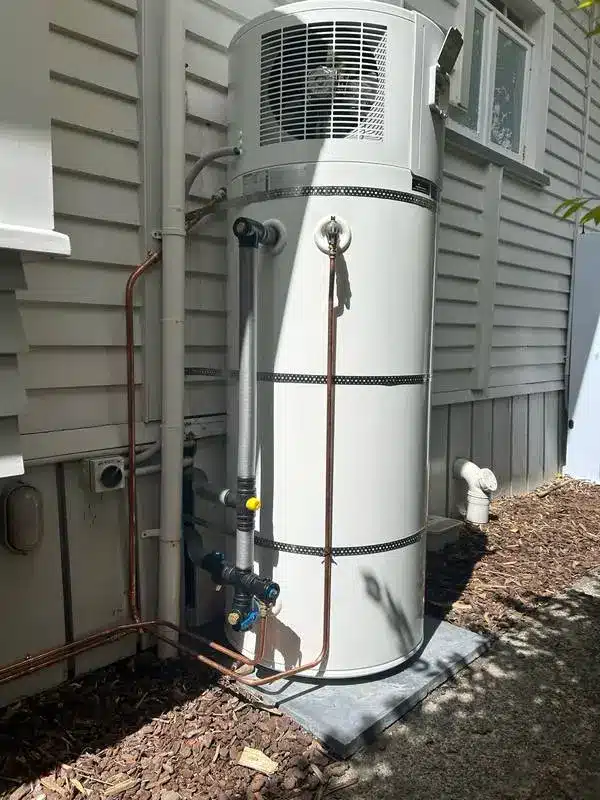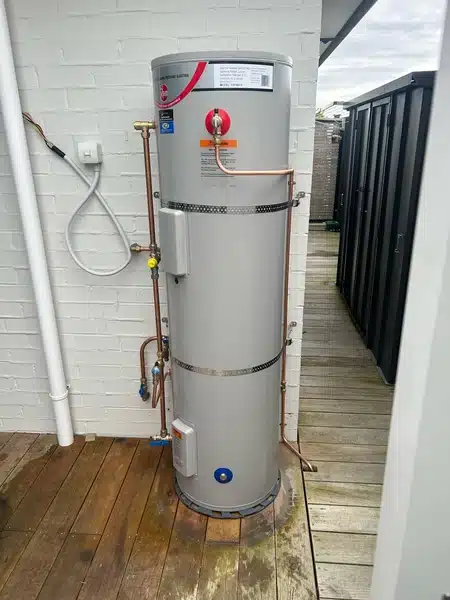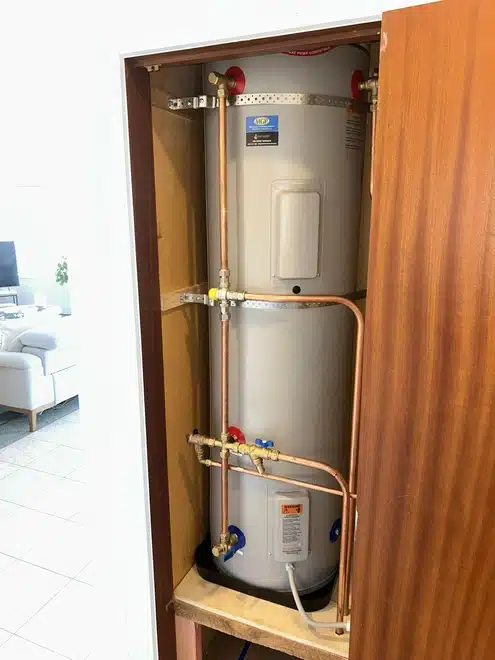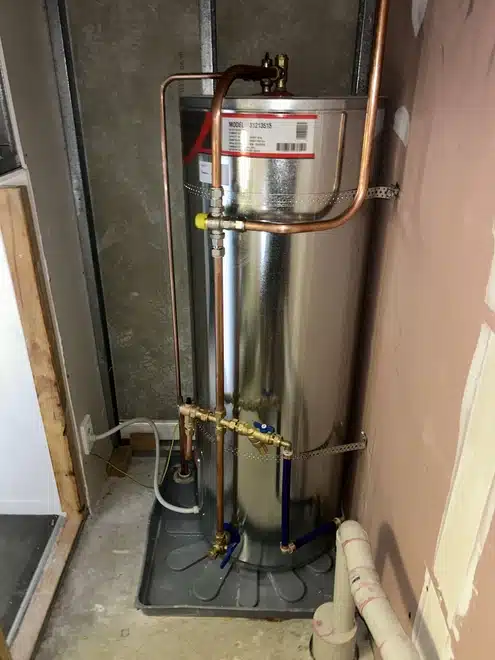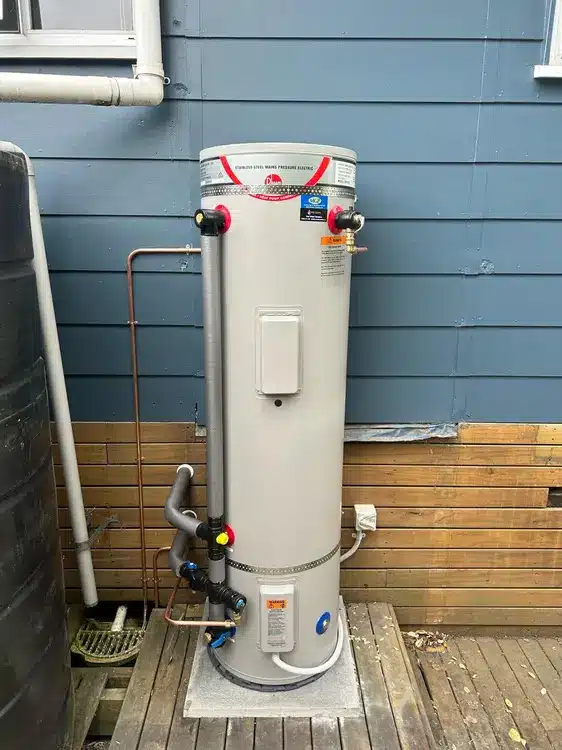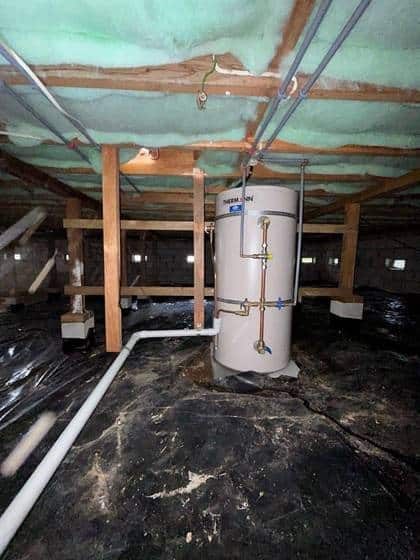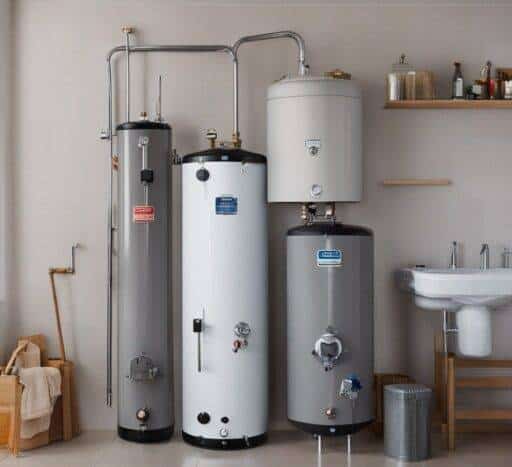How These Water Heaters Work
A heat pump works a bit differently than traditional water heater systems. Like a refrigerator or air conditioner, they use a vapour compression cycle to remove heat from the surrounding air and transfer it to the water stored in an insulated tank. This allows them to generate up to 3-4 times more heat energy than the electrical energy they consume. Models are available for both indoor and outdoor installation.
Pros of Upgrading
There are some compelling reasons you may want to upgrade to this system:
Energy Efficiency
The main advantage of this water heater is energy efficiency. Because they use heat from ambient air rather than generating it solely through electrical resistance, they can be much more efficient. In fact, these water heaters use about 50-80% less electricity than conventional electric resistance storage tank water heaters. This can lead to significant energy bill savings over time.
Environmental Benefits
Greater energy efficiency also means these heaters have less environmental impact. They produce fewer carbon emissions since they don’t have to burn as much fossil fuel for electricity generation. This makes them a greener choice than standard electric or gas water heaters.
Lower Operating Costs
Given the improved efficiency of these water heaters, your household’s annual water heating costs can be $100-$300 lower compared to a standard electric model. They do cost more upfront, but the energy savings allow you to recoup the higher initial investment over several years in most cases.
Cons of Upgrading
While they offer some attractive benefits, there are also a few downsides to consider:
Higher Upfront Cost
The main potential barrier to upgrading is the higher purchase price. These water heaters can cost about 1.5-2X as much as conventional storage tank models upfront. Installation costs may also be somewhat higher given the need for condensation management and outdoor ventilation requirements with some units. The payback period ranges from 2-7 years.
Venting and Condensation Requirements
Most heaters require an outdoor vent for heat exchange process as well as a drain or condensate pump to deal with moisture buildup from extracting heat from humid air. This can make installation more complex compared to standard electric tanks. Poor venting can also contribute to icing and system shutdowns in very cold climates.
Larger Physical Footprint
In addition to venting requirements, the cylinders are also physically larger than standard models. They may stand around 6 feet tall with a 24-30 inch diameter. You’ll need adequate floor space as well as 8+ foot ceiling clearance. This larger size can make retrofitting existing spaces more difficult.
Lower Hot Water Output
One other disadvantage applies mainly to storage units designed to replace existing conventional storage tanks. While they preheat water efficiently, most units utilize a lower-powered 4500-5500W backup heating element compared to legacy 4000-5500W elements. This may result in slightly less hot water capacity during simultaneous use across multiple fixtures.
Smart Technology Recommended
To maximize efficiency, most manufacturers recommend pairing your water heater with an intelligent WiFi controller or smart home integration. This allows you to monitor system performance, track energy savings, and adjust temperature or heating modes from an app. While convenient, this does add to the overall technology investment in your home.
Key Considerations
Determining if upgrading your water heater makes sense depends chiefly on a few key factors:
-
Climate – this new technology performs optimally in temperate climates without extreme lows below freezing. Performance declines below 40°F. Also consider humidity which aids heat extraction.
-
Household Size – Larger families with high hot water demand will maximise savings potential. Lower capacity may impact smaller households.
-
Upfront Budget – The higher initial cost may deter some buyers despite longer-term savings. Consider rebates which improve payback.
-
Physical Fit – Carefully measure space limitations upfront. Outdoor sheds sometimes used for extra capacity. Existing wiring may also need upgrading.
-
Tech-savviness – To reap the most savings benefit from advanced control features, some comfort with technology is helpful but not essential.
Other Considerations Before Upgrading
If you decide a this water heater is right for your home, there are a few additional factors to weigh as you select a specific model.
First, determine whether you want an outdoor unit or compact indoor model depending on space constraints and noise sensitivities. Outdoor units require weather-resistant external placement with ample air circulation, while indoor versions must have ducted indoor air exchange.
Also consider tank capacity based on household size and peak demand. Standard tank sizes range from 50-80 gallons for residential systems. Larger households may benefit from multiple cylinders for added capacity and simultaneous use capabilities.
Finally, look for ENERGY STAR certified water heaters as they have undergone testing for stated efficiency levels and environmental performance. The location of backup heating elements can also optimise efficiency and standby losses when not in use.
Taking the time to properly assess and select the right size and type of system for your specific home will help ensure your shiny new water heater performs to its full potential for savings over its lifetime. Discuss options with qualified installers as well.
Final Words
While the upfront investment is higher, this type of water heater can pay back through energy savings fairly quickly and reduce environmental impact. For climate-appropriate homes with adequate space and a willingness to pay more initially, these heaters are an efficient way to upgrade a hot water system. But they also may not suit every home or owner. Assessing your specific needs and ultimate costs and benefits can clarify if they make sense in your situation. Consult with water heating experts as you evaluate options.
Use our contact us page to reach us and we will be more than happy to discuss your hot water situation. Or give us a call on 0800 497658.
At Hot Water Solutions all we do is hot water!

